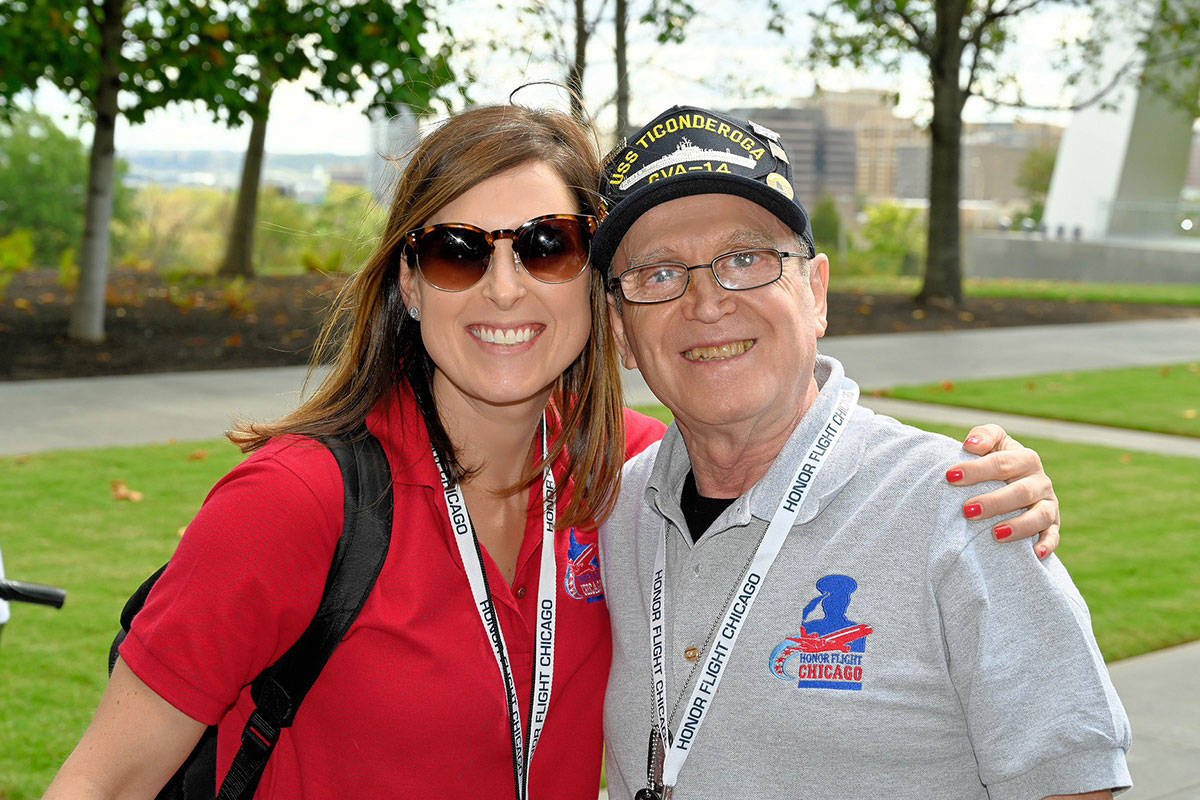Katie Meyer is as involved as a medical guardian can be with Honor Flight Chicago. Since taking her first flight in 2016, she has gone on to become one of our medical application screeners and performs curbside check-in duties on days when she doesn’t fly – thought she would fly every time given the chance!
“I first heard about the organization through a co-worker who had gone on a flight and came back just raving about it,” Katie said. “I would fly every month if I could. I love watching all the veterans and how excited they are and how the volunteers are equally as excited to be there. I like to go on as many flights as possible.
“I’ve always admired the men and women of the military. (Serving) was something I was never brave enough to do. This was an amazing opportunity where I could use my nursing skills as a small way to say thank you.”
As an emergency room nurse, thank you is not something that Katie has heard very often over the course of her career.
“When you think about what the ER is for, people’s experiences aren’t always the best there — whether it is the death of a loved one, or an injury or when we have to tell someone that they need emergency surgery,” Katie said. “We don’t hear thank you very often, so it certainly is appreciated and touching when we do.”
Honor Flight Chicago was founded for the purpose of telling our senior war heroes those two words that they didn’t often hear: “Thank You.” It’s heartwarming to know that Katie and her co-workers are now also hearing it much more often.
“It is very strange (to hear thank you so much),” Katie said. “I don’t know, I’m just doing my job and doing what I love. Being a nurse is the best job in the world next to being a wife and a mother. It feels very strange to be getting all of this recognition.”
It’s not just recognition that Katie is feeling, but also community support in the common fight against COVID-19.
“I haven’t gone to the hospital once where the breakroom table hasn’t been covered in food,” Katie said. That’s just the tip of the iceberg, though. She continued: “A couple of weeks ago, my hospital issued a mandatory masking protocol basically meaning that at all times in the hospital we need to be wearing a mask. They were getting us fabric masks but they hadn’t come in yet.
“On my community’s Facebook page some women were offering to make masks for anyone who might have needed it. I reached out asking if they had a couple of masks to donate. Next thing I know I had 140 masks on my doorstep. It was so fantastic. I couldn’t keep up with the messages people were sending. My mailbox was stuffed. My husband was kind enough to go and get some that people wanted to donate but couldn’t drop off themselves.
“They also were sewing headbands for us to save our ears. The backs of your ears get very raw from having those loops on them all day. My co-workers were so grateful for all of it. We got so many that my personal unit now is covered, so I can donate to other units or to the families of other people in healthcare.”
ER life in the COVID-19 era is staggeringly different. Katie’s facility has done an exemplary job in preparing to handle a coming surge in patients that they all feel is still to come. Tents are set up outside, which has changed the dynamic of the department.
“As ER nurses, we do disaster training but this is not something that we have ever actually lived through before,” she said. “Seeing those tents is kind of sobering.”
At the same time, general traffic in the ER has ground to a halt – which is a good thing according to Katie and her fellow staff.
“People are nervous to be here, and the community is listening to the fact that they need to say home,” she said. “The hospital is the last place you want to be, so we are only seeing true emergencies or COVID-19 complications. Before, you would get a lot of people who use their ER as their primary care site. This is a huge change.
“There was a conversation some of us were having the other day that maybe in the future this will make people think twice about coming to the ER for this, that and the other. We are hoping that this will spark the discussion for people to use the ER more appropriately. That is a good that could come from this.”
Though she feels odd accepting the newfound thank yous she is hearing – especially when compared to the senior war heroes she is accustomed to assisting with Honor Flight Chicago – Katie’s entire life has changed as she “just does her job.” She is distancing herself as much as she can from her family, moving into the guest bedroom in their home. With kids off school, however, Katie also is a “full-time teacher five days a week” to make sure they are continuing with their education. It has been difficult, she says, especially not being able to hug or kiss her family for weeks.
We can’t wait to get back on the plane with Katie and our other medical guardians and volunteers to be able to give them a warm thank you when we resume taking our senior war veterans to Washington, D.C., for their Day of Honor!
“Being a nurse is the best job in the world next to being a wife and a mother. It feels very strange to be getting all of this recognition.”


